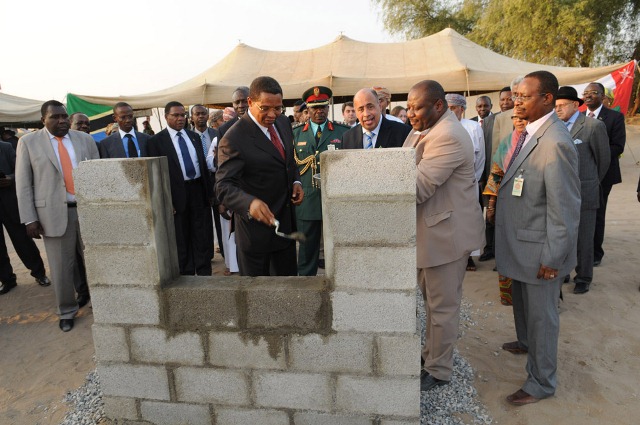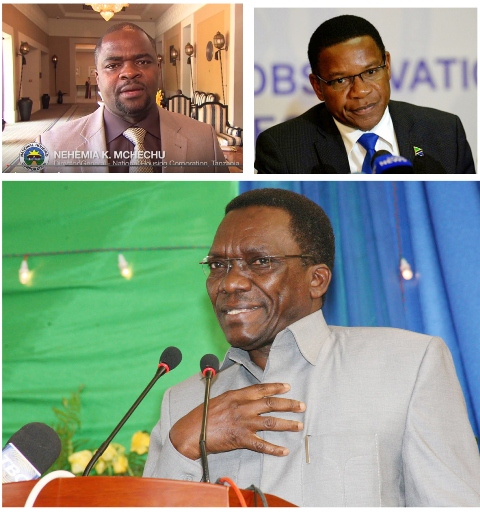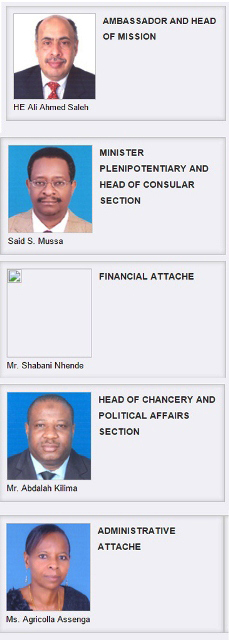
Tanzania President Jakaya Kikwete (Centre) lays foundation stone to kick-off construction of Tanzania Embassy in Muscat, Sultanate of Oman. Photo Credit: Tanzania Embassy, Muscat
By TZ Business News Staff.
The recently released Controller and Auditor General’s report in Tanzania lists the country’s Embassy in Muscat as the nation’s only Government office with an “adverse” audit opinion, while it also identifies the Ministry of Lands and National Housing Corporation (NHC) among public enterprises with suspicious books of accounts.
An adverse audit opinion represents a red flag on an organization’s financial statements, indicating existence of significant problems with the books, where an adverse balance represents excess of payments over receipts.
Tanzania is currently managed through a combination of 55 Ministries and Executive Agencies. The Treasury Registrar (TR) Statement of Government Investments says there are currently 238 Public Enterprises in the country. The Government majority share owns 166 of these by more than 51% of the shares while it owns 62 with minority interest. The number of PEs increases when 26 Urban Water Authorities are added into the mix as well as new PEs which are formed periodically–such as the recently formed National Identification Authority as well as National Social Security Regulatory Authority.
The Tanzania Embassy in Muscat is the only Tanzania central government entity carrying an “adverse” audit opinion in the 2012/2013 CAG report released in May, 2015.
The Embassy reported in the statement of cash flow a closing balance of TShs.150,681,699 instead of TShs.639,874,314 after omitting one transaction of cash receipt of TShs.97,065,176 and including an unanalyzed exchange loss of TShs.392,127,439 resulting into an understatement of TShs.489,192,615, the CAG report says. The current exchange rate is Tsh. 2000 for one US dollar.
The Embassy collected TShs.564,194,173 of which TShs.456,085,421 was banked leaving TShs.108,108,753 unbanked and it is likely that the money was misappropriated. The amount misappropriated has understated the cash and cash equivalent balance reported.
The Embassy did not perform bank reconciliation for all the period from 1st July 2011 to 30th June, 2013. In the absence of bank reconciliation, the correctness of the cash and cash equivalent balance at the year and could not be ascertained.
Muscat has received the “adverse” audit opinion from a list of MDAs who collectively misused some Tsh. 600 billion from public funds during the audit period–which is financial years 2009/2010, through 2012/2013.
Books of accounts for the Embassy of Tanzania in Kinshasa, the Democratic Republic of Congo and the Tanzania High Commission in Kampala, Uganda, carry the “qualified” audit opinion, , an indication the accounts also contain serious queries.
Tanzania’s Minister of Foreign Affairs and International Co-operation Bernard Membe did not respond to a text message asking for comment on the possibility of government action concerning this suspected misuse of public funds.
The Prime Minister’s office, led by Mizengo Kayanza Peter Pinda, the Tanzanian who once described himself as ‘the son of a peasant’ is among eight ministries with dubious expenditures. The books of accounts from the Prime minister’s office and the Tanzania Commission for Aids (TACAIDS) which is also in the Prime minister’s office carry the negative “qualified” audit reports.
The Prime Minister‘s office received an amount of Shs.2,750,989,763 development/capital expenditure. However, this amount was not disclosed in the cash flows statement as cash flows from financing activities as required by IPSAS 2. The office also over-paid a contractor by TShs.25,947,276.

Above, from Left: National Housing Corporation Director General Nehemia Mchechu, Minister of Foreign Affairs and International Co-operation Bernad Carmilius Membe. Bottom: Tanzania Prime Minister Mizengo Kayanza Peter Pinda.
The PMO contracted Stefnat Engineering and Technical Services Ltd to refurbish the old German Building and disaster management located at Oyster bay at a contract price of Shs.3,177,477,826. The final contract valuation reported a tota TShs.32,954,790 as a balance due for payment to the contractor. However, the total funds paid for the final payment was Shs.58,902,066 resulting into unexplained difference of Shs.25,947,276 to the contractor.
The Tanzania Commission for Aids (TACAIDS) in the Prime Minister’s office was found to have expensed unutilized inventories valued at TShs.222, 013,632 contrary to the requirements of IPSAS 12 (44).
An expenditure amounting to TShs.79,607,500 was also not supported by appropriate acknowledgement receipts and retirement particulars. In the absence of these supporting documents, the authenticity of the amount paid could not be established.
Contradicting information in the financial statements were also found in that there was a contradiction on the amount of exchequer issues received during the year, whereby, in the commentary to the financial statements (pg.14) and statement of exchequer received (pg.56) disclosed an amount of TshShs.9,167,936,780 while the statement of vote account (pg.47) disclosed an amount of Shs.9,691,811,644, which created a difference of Shs.523,874,864.
TACAIDS disclosed that, 3 grounded motor vehicles and furniture and fittings were disposed of for Shs.31,800,000 and Shs.4,231,000 respectively. However the amount of disposed motor vehicles was not deducted at all in the PPE movement schedule to arrive at the balance as at 30th June 2013, while an amount of Shs.127,787,101 was deducted in respect of furniture and fittings instead of Shs.4,231,000 which was disclosed in the note.
Of Tanzania’s 30 Regional Administration Secretariats, the CAG found 16 offices to have questionable books of accounts. The dubious-spender Regional Secretariats (RSs) listed are Katavi, Njombe, Tanga, Simiyu, Kigoma, Kagera, Dar es Salaam, Iringa, Ruvuma, Rukwa, Mara, Arusha, Shinyanga, Kilimanjaro, Mwanza and Tabora.
The other seven ministries with “qualified” audit opinions include Ministry of Communications, Science and Technology, Ministry of Agriculture, Food Security and Co-operatives, Ministry of Livestock and Fisheries Development, Ministry of Home Affairs (and its Fire and Rescue police force), Ministry of Lands, Housing and Human Settlement, Ministry of Health and Social Welfare, and the Ministry of Education and Vocational Training.
The Ministry of Home Affairs reported outstanding accounts payable of TShs.84,295,595. However, this amount was not supported by invoice, delivery note, issue voucher and receipt voucher. For this case, we could not confirm its correctness. The accountability of fuel supply was not confirmed. Audit of the supplies and consumable component noted fuel of Shs.83,000,000 was paid to M/S CEO Government Procurement Services Agency. However, the audit team could not verify accountability and utilization of procured fuel and therefore audit scope was limited.
The Ministry of Lands received Shs.1,451,862,356 for acquisition/ construction of PPE. However, this amount was not disclosed in the cash flows statement as financing activities. Contrary to Regulation 162 of the PFR of 2001, the Ministry did not prepare bank reconciliations as a result, the correctness of the amount of cash and cash equivalent of Shs.5,734,804,409.97 reported in both the cash flows statement and the statement of financial position could not be established.
The Ministry intended to compensate the owner of the plot No. 12 Block 65 which was located in karikoo; with Plot No. 2009 Block 2 (371 sqm) Kurasini with reserved value of Shs.970,000,000 as it was observed in the invoice No. 8612012 of 19 September, 2011. However, this intention was later reversed and instead, he was compensated with plot No. 2003 in Block 1 (131,000 sqm) with a value of Shs.3,240,000,000 located in the industrial areas.
It was further noted that, incorrect information was given to the Ministry regarding Plot No. 12 Block 65. The actual area of this plot was 371 sqm against the claimed area of 750 sqm.
It was noted that, out of the 263,000 title deeds issued in the Eastern Zone, only 22,740 or (9%) were recorded in the Land Rent Data Base System leading 240,260 certificates unrecorded. This limited the audit in establishing the amount of land rent which should have been collected. It was noted that, up to October 2013, information from the directorate of Surveying and Mapping indicate that 187,896 plots in DSM city had been surveyed and obtained an approval from the Director of Survey and Mapping .
However, the Ministry‘s Land Rent Data Base System shows only 128,236 plots to have been entered into the system for collecting annual land rent, which recorded un-reconciled differences of 59,660 plots. Hence the audit could not establish the amount which was supposed to be collected. National Housing Corporation was found to have issued Tsh1.75 billion in tenders using a non-competitive bidding procedure and this led to only one company being picked to do the job. NHC is led by Nehemia Mchechu as Director General.




